Every city has a certain literary quality that draws writers back again and again. Paris inspires stories of romance and revolution, for instance, while New York seems mired in tales of power and corruption.
London, though… London is all about finding that one tiny crack, twisting alley, or Magical Doorway that leads you into another world. Sometimes the encounter is horrifying, and sometimes it’s filled with wonder. Either way, once you’ve found the magic, there’s simply no turning back. We’ve gathered some of our favorite hidden and alternate-Londons below—come, follow us underground!
Neverwhere—Neil Gaiman
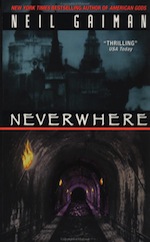
Neverwhere takes the idea of a magical realm and gives it a social conscious. London Below is fantastic in some ways—a magical city run according to a system of favors, where people are bound by honor. However, the darker reading is that in our London these people are homeless, having fallen through the cracks of society, unwanted and unseen by us. Richard Mayhew, who is a stranger to London Above due to his status as a Scot, enters London Below by accident when he tries to help a young girl named Door.
Like many Gaiman heroes, Richard tries to do the right thing, and quickly discovers that the right thing is far more complicated than they could have imagined. The more he learns about the other world, the more London Above fades from his mind.
The Difference Engine—William Gibson & Bruce Sterling
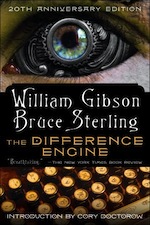
Alterna-steam-punch-Lovelace-card-punk! In this alternate London, Charles Babbage’s Difference Engine works, and is put into wide use, allowing Britain to lead a Technological Revolution and remain a superpower.
Lord Byron and Ada Lovelace both live, with Byron leading the Industrial Radical Party, and Lovelace making a name for herself as a mathematics lecturer in France. The US never centralizes, instead remaining a collection of smaller republics and colonies, and the Irish Potato Famine is averted. So, mostly a win?
Un Lun Dun—China Miéville
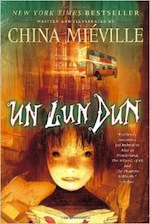
Many of China Miéville’s works deal with mirror versions of cities and people. In Un Lun Dun he gives us a shadow London, which is linked enough to our London that decisions made here have tangible effects on the UnLondoners.
For instance, when the Clean Air Act took effect in the late 1950s, London’s smog was driven to UnLondon, where it was able to become a sentient monster resembling the Nothing. Luckily, two Londoners fall through a passageway into UnLondon just in time to help in the fight against evil.
A Darker Shade of Magic—V.E. Schwab
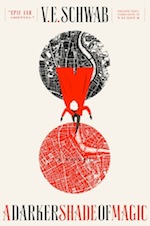
V.E. Schwab’s A Darker Shade of Magic hops between parallel Londons, each the result of different wars and cataclysms. Grey London slogs under the rule of a mad King George, with no magic and no mystery. Red London is the heart of a flourishing Empire, and magic is honored. White London has been drained of its life in the constant struggle between would-be Magician-Kings, and Black London was lost long ago.
Kell, a Prince of Red London, is one of the last people still capable of traveling between Londons. Officially a messenger between worlds, he also uses his powers to pursue a profitable side career as an inter-dimensional smuggler—which leads to some problems when Kell finds himself the target of darker magic than any he’s faced.
Harry Potter series—J.K. Rowling
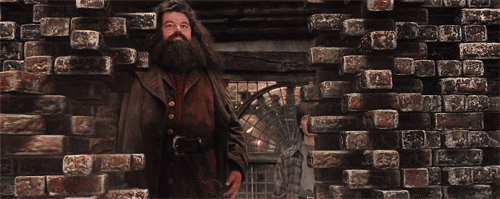
J.K. Rowling spends the first few chapters of the Harry Potter series showing us the drudgery of Harry’s life in suburban England, which makes the reveal of Diagon Alley even more wide-eyed and full of wonder.
The moment Hagrid taps that special brick over to take Harry into Diagon Alley, we’re immersed in a slice of London that runs on a different economic system, has special foods, and dedicated train platforms that Muggles can’t see. The wizarding parents are just as frustrated by the crush of back-to-school shoppers as they would be in a Muggle mall, and the kids are just as oblivious because they’re too busy looking for friends they haven’t seen all summer and pushing each other for a glimpse of the new Nimbus 2000. But for Harry and his readers, this is the introduction to a world that is infused with magic and wonder, and it is love at first sight.
London Falling—Paul Cornell
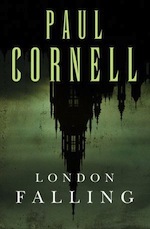
Paul Cornell has written novels, comics, and piles of Doctor Who tie-in books, radio plays, and scripts, (including the two-part “Human Nature” and “Family of Blood”) plus some short fiction featured on Tor.com!
For the purposes of this post, however, we’re going to focus on his two Weird London books: London Falling and The Severed Streets. In London Falling, a veil is lifted on the supernatural world, as previously ordinary people suddenly develop the ability to see things that are usually hidden. Police officers Quill, Costain, Sefton, and Ross are on a normal investigation in a normal crime procedural when their story abruptly jumps tracks and turns into a horror-tinged fantasy.
After coming in contact with a mysterious artifact, the officers can see supernatural creatures, and come to understand the role an ancient witch has played in the history of the city. The Severed Streets continues the occult rewrite of London’s history by checking in with everyone’s favorite, Jack the Ripper. Except this time, Jack’s targeting rich white men.
Stoneheart Trilogy—Charlie Fletcher
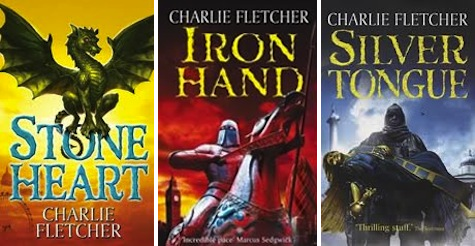
Charlie Fletcher’s Stoneheart Trilogy gives us a classic hidden-in-plain-sight alternative London. Here, young George breaks the head off a dragon statue in a fit of anger, and finds himself trapped in a London where the statues are at war with each other. Luckily he meets a friendly World War I memorial statue that acts as a companion, and the pair is soon joined by Edie, a young girl who can see into the past. The three of them work to defeat The Walker, a mysterious villain who has been cursed with unceasing movement, and envies the statues their stillness.
Rivers of London series—Ben Aaronovitch
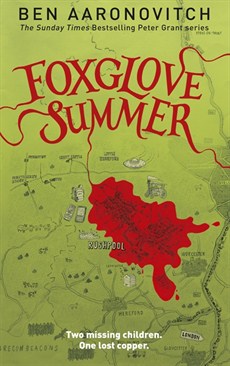
A newly graduated London police officer, Peter Grant, accidentally encounters a ghost. He’s then apprenticed to DCI Nightingale, England’s last official Wizard, and begins a career with the division of the Metropolitan police that deals with supernatural cases. In the first book of the series, he finds himself brokering a peace between the two gods that live in the Thames. In the second, Moon over Soho, Grant must investigate a series of mysterious deaths that strike London’s jazz community, and bear signs of magic. Whispers Under Ground traces the murder of an American student to a secret world that lies beneath the London we know, and in Broken Homes an associate of the twisted magician known as the Faceless Man may be responsible for murders south of the river.
The upcoming fifth book in the series, Foxglove Summer, sees PC Grant investigating the disappearance of children from a small village in Herefordshire—naturally, not everything about this sleepy village is as it seems.
Anno Dracula—Kim Newman
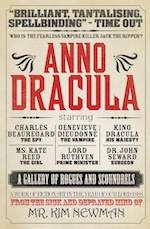
Rather than a secret London, this is a completely alt-London, with vampires! Dracula, having defeated Van Helsing and turned Mina Harker, does the most Victorian thing ever and marries the Queen. Wait, wait, never mind, the most Victorian thing ever comes next, when the Diogenes Club hires a detective and a vampire to hunt down…aw, crap, it’s Jack the Ripper! Killing vampires. By gaslight.
This book spawned a decade-hopping alt-vampire series, and has featured cameos by pretty much every notable creature of the night, plus a great rogues gallery of genre luminaries including Raffles, Dr. Moreau, and Carl Kolchak!
So that’s our list of Hidden London destinations—did we miss any? Have any of you stumbled down a dark Shoreditch alley at night, only to find yourself in a strange London, under stars that are not quite our stars?
Leah Schnelbach spends a large portion of each day looking for the wrong turn that will take her into Hidden New York. Perhaps, in that strange yet comforting dimension, she updates Twitter more often?










Kate Griffin’s Matthew Swift series; A Madmess of Angels, Midnight Mayor, Neon Court and Minority Council.
I’d add Marie Brennan’s “Onyx Court” series, starting with “Midnight Never Come.”
Her London-below-London is gorgeous and her fairy-folk solidly based on English folklore.
You misseed the Alex Verus books, and the Felix Castor novels for starters. I find Felix’s London very good indeed.
Dr. Who’s London, where pig-piloted spaceships crash in the Thames, Cybermen and Daleks march in the streets, the internet steals your soul, amd everyone flees to the country at Christmas?
Or Ankh-Morpock?
Mustn’t forget the England of Jonathon Strange and Mr. Norrell!
I’ll add Emma Newman’s SPLIT WORLDS novels. The second novel, particularly, is focused on the magical city aside London, Londinium.
I dunno, I think my favorite “weird London” is the one from the TlF-TravelAlerts pardody twitter feet. A world where Tube trains won’t arrive until they get velvet curtains in the stations so they can make an entrance, a world where you must refrain from feeding fried eggs to the escalators, a world where the punishments for standing in front of the yellow line are …[significant pause]… dire, and let us not forget the pineapples!
Daniel O’Malley’s The Rook has another take on the supernatural law enforcement trope, but more as a spy novel than Aaronovitch and Cornell’s procedurals.
moorcock’s mother london immediately came to mind
Veering off into BBC radio territory, how about Ben Moor’s surreal comedy Undone?
The Black London series by Caitlin Kittredge – set in the modern day, with ghosts and a supernatural shadow-world London that exist for those with eyes to see it.
Book #1 is “Street Magic” for anyone interested.
Peter Ackroyd’s novel Hawksmoor follows Iain Sinclair’s Lud Heat in positing that the Baroque architect Nicholas Hawksmoor had some occult scheme in mind for the design and geographic placement of his churches. Travellers to LonCon3 this summer via the Docklands Light Railway may have noticed one of his less scary churches, St. Anne’s Limehouse, on their route.
I was spooked by a Hawksmoor church in Bloomsbury once; on a dark night I passed some wrought iron railings, and sensed a mass above me. As I looked up, lightning chose that exact moment to light up a man in Roman armour with a sword, standing on a ziggurat! Who puts a thing like that on top of a Christian church!?
I’ll add another vote for Alex Verus, just started them recently.
One’s I’ve read recently: Mark Hodder’s Burton and Swinburne London; Meljean Brooks’ London of the Iron Seas trilogy; the Hellsing manga series takes place almost entirely in an alternate London; Gail Carriger’s Soulless series’ London.
I believe London and Oxford are portrayed in two aspects in the His Dark Materials books . . .
Lilth Saintcrow’s Bannon and Clare series, a steampunk/holmes/magical mashup that is too desne to be believed.
I’ll add Simon R. Green’s wonderful Nightside novels.
Am I the only one who remembers the London of Michael DeLarrabeiti’s the Borribles. The Peter Pan myth was never so dirty or dark.
Let’s not forget the 1966 London of Randall Garrett’s Lord Darcy mysteries…
Let’s not forget John Constantine’s London especially the Jamie’s first run on the series.
Kate Griffin’s urban magic London in her Matthew Swift and Magicals Anonymous series. As Catherine Webb, her Victorian steampunk London in the Horatio Lyle series of children’s books. As Claire North the endlessly returning London (and everywhere else) in “The First Fifteen Lives of Harry August”.
Also, Roofworld by Christopher Fowler. Sadly long out of print.
The Thursday Next series is set in an Alternate universe version of london. Just read the latest Alex verus novel and its great. Also love the Mathew Swift novels. It’s weird but a number of books I adore are set in England.
China Mieville’s UnLunDun is in there, but there’s also the frightening alternative London of Kraken, with its Squid Worshippers, Londonmancers, Gun Farmers, Museum Angels and Amy Winehouse lookalike psychic cops
…also, the roofed London of Michael Moorcock’s Gloriana
Oh and there’s also Mike shevdon’s courts of the feyre series.
Making my entrance with my usual flare-gun … have you not read The Satanic Verses, by Salman Rushdie? That is the Ell Oh En Dee Oh En of the immigrant, hidden openly in plain sight, a world where someone can sing two travellers falling from an exploded arliner, down to safety, where one of those travellers turns into something demonic with an angelic face, while the other turns into something angelic with a demonic face …
Check out the magical London in Ben Aaronovitch’s River of London series. The person who recommended it to me is Lois McMaster Bujold, and it is excellent!
Kate Locke’s vampires-as-aristocrats Immortal Empire series deservers a nod, methinks.
The London you get in the BBC radio comedy “Bleak Expectations”. Which also gets bonus points for Anthony Stewart Head doing silly voices.
What about Jasper Fforde’s alternate London (and world) from his Thursday Next books?
How about the grubby London of Michael de Larrabeiti’s The Borrible Trilogy.
No Laundry Files London? A London where The Laundry keep our reality safe from lovecraftian horrors from beyond the mathematical curves?
Great list and great comments too.
Mieville’s “Kraken” has some of the most inventive characters to my mind; Subby and Goss , monsters !…Perky the Pig, Tattoo and the shape-shifting Egyptian funerary entity.
The London of The Enemy series by Charlie Higson certainly deserves a nod and a visit. Thanks
My question is why. Why does this concept exist? It seems like London is the main city that people write about having an alternate version, and I cannot figure out what started the genre.
@37 Probably blame Charles Dickens for this. His works always featured London heavily in them, and he took pains to describe the poverty and ruin within it as a call to remove that poverty (we should get on that sometime soon), and his popularity cemented it as the city to write about. Dickens only really stepped into the genre with A Christmas Carol, but his vivid descriptions of London were picked up as the genre emerged. Conan Doyle’s Sherlock Holmes works also were probably a major influence on the genre, despite being only marginally in it themselves. In the modern age I’d put the Magical London Genre’s popularity down to the Disney version of Mary Poppins. A movie that is a part of pretty much every current author’s childhood and scenes like Mary sitting on her cloud or Bert dancing with the chimney sweeps on the rooftops probably imprinted on the creative consciousness pretty deeply.